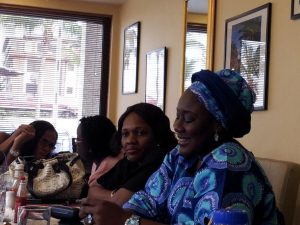Nigerian women present an interesting contrast: they are strong and powerful but at the same time their social status is that of their husband. Gender inequality remains a big issue in sub-Saharan Africa (SSA) – as in so many other countries, for that matter. One step at a time, the situation may improve. Organizations like Mujeres por África (Women for Africa) contribute to such a change.
Gender inequality translates into a huge drag on socio-economic development. For instance, when a society leaves half of its population behind in terms of opportunities and recognition, an important part of its potential for new ideas and motion vanishes with it. Let’s take a look at the index for gender inequality that the United Nations publishes across countries. It measures gender inequalities in 3 important aspects of human development:
- Reproductive health, measured by maternal mortality ratio and adolescent birth rates.
- Empowerment, measured by the proportion of parliamentary seats occupied by females, and the proportion of adult females and males with at least some secondary education.
- Economic status, measured by the rate of participation labor force of female and male populations.
The top performers in the world are Slovenia, Switzerland and Germany with values of gender inequality below 0.05. In the SSA region, we can easily highlight Rwanda, Namibia, South Africa, Botswana and Burundi as the most gender-equal countries in SSA, with scores below 0.5. On the other hand, Chad, Côte d’Ivoire, Mali, Liberia and Sierra Leone are the most-gender unequal with scores above 0.65.

As we have mentioned before, when a society systematically sets aside a large fraction of its own population, it ends up missing a lot of opportunities to build upon these lost minds and ideas. So, it’s not surprising that the top-10 countries with the lowest gender inequality index in SSA score well above the average in terms of entrepreneurship and development, according to the Global Entrepreneurship and Development Institute (GEDI) index, whereas the 10 countries with the highest gender inequality scores significantly lower.
Fighting gender inequality is not fair both for moral reasons and for socioeconomic development. It’s a must in order to stop destroying potential ideas. The problem needs to be tackled from its origins at the education system to its latter stages in the working place.
Initiatives such as those Mujeres por África leads are important to this end. They tackle key areas where gender inequality hits the most:
- Education: they provide great scholarships to prospect African women to study in Spain;
- Knowledge: they support African women in their access to scientific investigation centers;
- Health: they lead informative campaigns regarding malaria and other transmittable diseases related to sanitation conditions;
- Economic development: they lead programs, such as the Launch & Grow, designed to exploit all women potential through an intensive course and a mentoring process.
- Empowerment: they gathered women leaders around Africa to discuss about leadership and governance with other world leaders such as John Kerry, Samantha Power or Janet Yellen.
Would you like to share your views on gender inequality?
Nadim Elayan, Research Assistant at IESE Business School, collaborated in this article.
_______________________________________________________________________________
Related articles


Thank you Nadim and Africa for this topic 🙂 The figures are interesting but … I specifically liked your point when you stated about ‘lost minds and idea’ as a result of women marginalization in SSA! In my country Tanzania, unfortunately, some ethnic groups still practice some very un-welcomed taboo practices against women that include justification of violence, rape and female genital mutilation (FGM). The emotional stress, trauma, silence and unworthiness these women face is unbearable!! As we celebrate Women’s Day, conversations like yours Nadim and Africa are so invaluable to policy makers, governments like Tanzania and international organizations to continue advocating to improve women’ welfare across the world. Asante sana! (Thank you!)
Thank you very much,
Every mind has a huge potential for new ideas which will very likely improve the standards of living of the society. If we systematically marginalize a fraction of the population (approximately 50%!!) potential ideas will vanish with them. It is particularly sad, since the same people who marginalize women would also benefit from these vanished ideas.
Thank you For information
“It measures gender inequalities in 3 important aspects of human development:
Reproductive health, measured by maternal mortality ratio and adolescent birth rates.
Empowerment, measured by the proportion of parliamentary seats occupied by females, and the proportion of adult females and males with at least some secondary education.
Economic status, measured by the rate of participation labor force of female and male populations.”
Thank you very much!